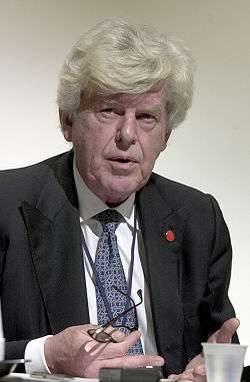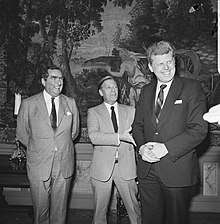Wim Duisenberg
Willem Frederik "Wim" Duisenberg (Dutch pronunciation: [ˈʋɪləm ˈfreːdərɪk ʋɪm ˈdœysə(m)bɛr(ə)x] (![]()
Wim Duisenberg | |
|---|---|
 Wim Duisenberg in 2001 | |
| President of the European Central Bank | |
| In office 1 June 1998 – 1 November 2003 | |
| Vice President | Christian Noyer Lucas Papademos |
| Preceded by | Office established |
| Succeeded by | Jean-Claude Trichet |
| President of the European Monetary Institute | |
| In office 1 July 1997 – 1 July 1998 | |
| Preceded by | Alexandre Lamfalussy |
| Succeeded by | Office discontinued |
| President and Chairman of the Bank for International Settlements | |
| In office 1 January 1994 – 1 July 1997 | |
| general manager | Andrew Crockett |
| Preceded by | Bengt Dennis |
| Succeeded by | Alfons Verplaetse |
| In office 1 January 1988 – 31 December 1990 | |
| general manager | Alexandre Lamfalussy |
| Preceded by | Jean Godeaux |
| Succeeded by | Bengt Dennis |
| President of the Central Bank of the Netherlands | |
| In office 1 January 1982 – 1 July 1997 | |
| Preceded by | Jelle Zijlstra |
| Succeeded by | Nout Wellink |
| Member of the House of Representatives | |
| In office 16 January 1978 – 28 June 1978 | |
| In office 8 June 1977 – 8 September 1977 | |
| Parliamentary group | Labour Party |
| Minister of Finance | |
| In office 11 May 1973 – 19 December 1977 | |
| Prime Minister | Joop den Uyl |
| Preceded by | Roelof Nelissen |
| Succeeded by | Frans Andriessen |
| Personal details | |
| Born | Willem Frederik Duisenberg 9 July 1935 Heerenveen, Netherlands |
| Died | 31 July 2005 (aged 70) Faucon, France |
| Nationality | Dutch |
| Political party | Labour Party (from 1959) |
| Spouse(s) | Tine Stelling
( m. 1960; div. 1980) |
| Children | Pieter Duisenberg |
| Alma mater | University of Groningen (Bachelor of Economics, Master of Economics, Doctor of Philosophy) |
| Occupation | Politician · civil servant · Economist · Researcher · Businessman · Banker · Financial analyst · Financial adviser · Corporate director · Author · professor |
| Signature |  |
Duisenberg attended a Gymnasium in Heerenveen from May 1947 until June 1953. Duisenberg applied at the University of Groningen in June 1954 majoring in Economics and obtaining an Bachelor of Economics degree in June 1956 before graduating with an Master of Economics degree in July 1961. Duisenberg worked as a researcher at the University of Groningen from July 1961 until September 1965 and got an doctorate as an Doctor of Philosophy in Development economics in April 1965. Duisenberg worked as a financial analyst for the International Monetary Fund (IMF) in Washington, D.C. from January 1966 until March 1969 and as a civil servant for the Central Bank of the Netherlands from March 1969 until February 1970. Duisenberg worked as a professor of Macroeconomics at the University of Amsterdam from 1 February 1970 until 11 May 1973.
After the election of 1972 Duisenberg was appointed as Minister of Finance in the Cabinet Den Uyl, taking office on 11 May 1973. The Cabinet Den Uyl fell on 22 March 1977 after four years of tensions in the coalition and continued to serve in a demissionary capacity. Duisenberg was elected as a Member of the House of Representatives after the election of 1977, taking office on 8 June 1977 but he was still serving in the cabinet and because of dualism customs in the constitutional convention of Dutch politics he couldn't serve a dual mandate he subsequently resigned as a Member of the House of Representatives on 8 September 1977. The Cabinet Den Uyl was replaced by the Cabinet Van Agt-Wiegel following the cabinet formation of 1977 on 11 May 1973 and he subsequently returned as Member of the House of Representatives after the resignation of Wijnie Jabaaij, taking office on 16 January 1978 serving as a frontbencher and spokesperson for Finances.
In June 1978 Duisenberg was named as Chief financial officer (CFO) of the Rabobank, he resigned as a Member of the House of Representatives the same day he was installed as Chief financial officer on 28 June 1978. In November 1981 Duisenberg was nominated as the President of the Central Bank of the Netherlands (DNB), he resigned as Chief financial officer of the Rabobank the same day he was installed as President of the Central Bank of the Netherlands, taking office on 1 January 1982. In June 1997 Duisenberg was nominated as the President of the European Monetary Institute (EMI), he resigned as President of the Central Bank of the Netherlands the same day he was installed as President of the European Monetary Institute, taking office on 1 July 1997. In May 1998 the European Monetary Institute was reformed to the European Central Bank (ECB) with Duisenberg nominated as the first President of the European Central Bank, serving from 1 June 1998 until 1 November 2003.
Duisenberg retired after spending 30 years in national politics and became active in the private sector and public sector and occupied numerous seats as a corporate director and nonprofit director on several boards of directors and supervisory boards (Air France–KLM, Achmea, Rabobank, Schiphol Group and the Rijksmuseum) and as an advocate and lobbyist for Financial regulation and European integration.
Duisenberg was known for his abilities as a manager and negotiator. Duisenberg continued to comment on political affairs as an statesman until his death after suffering a heart Attack and drowning in a swimming pool. Duisenberg holds the distinction as the first serving President of the European Central Bank.[1]
Early life and education
Willem Frederik Duisenberg was born on 9 July 1935 in the Frisian city of Heerenveen in the Netherlands.[2] He was the son of Lammert Duisenberg, who was a waterworks supervisor, and Antje Ykema.[3] He went to a public primary school in his hometown. He went to secondary school, first one year of Hogere Burgerschool and then gymnasium with natural sciences, also in Heerenveen.[2] In 1954, Duisenberg moved to Haren. He studied at the University of Groningen in Groningen from 1954 to 1961, where he received his doctorandus degree (equivalent of Master of Science) cum laude in economics, majoring in international relations. He was a member of Groninger Studentencorps Vindicat atque Polit. In 1959, he became a member of the Labour Party. In 1960, he married Tine Stelling.[2] In 1965, he obtained his doctor degree (equivalent of Doctor of Philosophy) with his thesis De economische gevolgen van de ontwapening (The economic consequences of the disarmament) under the supervision of professor F. J. de Jong.[2]
Politics


Duisenberg subsequently worked for the International Monetary Fund in Washington, D.C. for years followed by a year as an advisor to the director of the Nederlandsche Bank, the Dutch central bank in Amsterdam. He was then appointed a professor at the University of Amsterdam where he taught macroeconomics. From 1973 to 1977, Duisenberg was Minister of Finance under Prime Minister Joop den Uyl. Shortly afterwards, he gave up his seat in the Dutch parliament to become vice president of Rabobank, a Dutch bank. Two years later, he was appointed director of the Nederlandsche Bank, serving as its president from 1982 to 1997. His tenure at the Dutch central bank was marked by caution and reserve. Under his direction, the Dutch guilder was linked to the German Deutsche Mark, and this benefited the Dutch economy, owing to the strength of the German currency. He also followed German central bank's interest rate policies closely, which earned him the nickname "Mr Fifteen Minutes" because he quickly followed any interest rate changes made by the Deutsche Bundesbank.
First president of the European Central Bank
Owing to the success of his monetary policy, he became well known in other European countries, and this led to his appointment in 1998 as the first president of the new European Central Bank in Frankfurt, much to the chagrin of France, who wanted a French candidate. A compromise was agreed upon (although publicly denied by all parties) whereby Duisenberg would serve for at least four years, upon which the Frenchman Jean-Claude Trichet, director of the Banque de France, would take over. In 1999, Duisenberg received the Vision for Europe Award in recognition of his efforts toward the unification of Europe.[4]
During his tenure at the bank, Dr. Duisenberg was known for his cautious monetary policy and for defending the euro through its early years. He sometimes frustrated investors and politicians by sticking to the bank's inflation-fighting stance, keeping rates higher than some would have liked. "I hear, but I don't listen" to such pleas, was one of his typically blunt responses. Dr. Duisenberg repeatedly said it was up to European governments to pursue structural changes such as loosening rigid rules on hiring and firing personnel if they wanted more growth. Duisenberg announced he would retire on 9 July 2003 (his 69th birthday), but he remained in office until Trichet was cleared of charges of fraud in connection with the collapse of the French bank Crédit Lyonnais. Trichet took over presidency of the ECB on 1 November 2003.
Death
Duisenberg died in 2005 at the age of 70 while on vacation at his villa in Faucon near Orange, France. He drowned in his swimming pool after suffering a heart attack. A commemoration service was held on 6 August 2005 in the Amsterdam Concertgebouw. Duisenberg was buried later that day in the Zorgvlied cemetery in Amsterdam.[5][6]
Decorations
- Order of the Netherlands Lion (Netherlands)
- Commander of the Order of Orange-Nassau (Netherlands)[2]
- Knight Grand Cross of the Order of Isabella the Catholic
- honorary doctorate in Economics from the University of Amsterdam (8 January 2001)[2]
References
- "Wim Duisenberg (70) overleden" (in Dutch), RTL Nieuws, 2005.
- Dr. W.F. (Wim) Duisenberg (in Dutch), Parlement & Politiek. Retrieved 5 September 2015.
- "Duisenberg: wetenschapper, minister, centraal bankier en bemiddelaar" (in Dutch), NRC Handelsblad, 2005. Retrieved 6 September 2015.
- "Former Steering Committee Members". bilderbergmeetings.org. Bilderberg Group. Retrieved 8 February 2014.
- "Obituary: Wim Duisenberg", BBC News, 2005.
- Mark Landler, "New York Times Obituary: Wim Duisenberg", The New York Times, 2005. Retrieved 16 June 2015.
External links

| Political offices | ||
|---|---|---|
| Preceded by Roelof Nelissen |
Minister of Finance 1973–1977 |
Succeeded by Frans Andriessen |
| Government offices | ||
| Preceded by Jelle Zijlstra |
President of the Central Bank of the Netherlands 1982–1997 |
Succeeded by Nout Wellink |
| Preceded by Alexandre Lamfalussy |
President of the European Monetary Institute 1997–1998 |
Position abolished |
| New office | President of the European Central Bank 1998–2003 |
Succeeded by Jean-Claude Trichet |
| Diplomatic posts | ||
| Preceded by Jean Godeaux |
President and Chair of the Bank for International Settlements 1988–1990 |
Succeeded by Bengt Dennis |
| Preceded by Bengt Dennis |
President and Chair of the Bank for International Settlements 1994–1997 |
Succeeded by Alfons Verplaetse |
